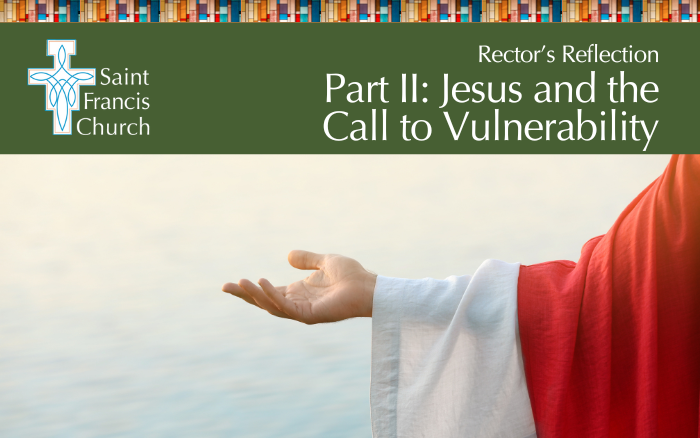It seems counterintuitive, foolish even, to write about vulnerability on September 11. We saw where being vulnerable gets us. Today, twenty-four years later, it can still feel as though we are overly vulnerable and susceptible to danger and disease. In last week’s Bellringer, I wrote about Jesus as a model of vulnerability. He made himself physically and emotionally vulnerable, but his Spirit was always strong. He rebuffed the devil three separate times in the desert, and though he asked his Father to take the cup from him, he didn’t flee the garden or the soldiers when they came to arrest him. But when Lazarus died, Jesus wept; he prayed so hard in the garden of Gethsemane the night before he died that he sweat blood, and before he breathed his last, he called to his Father, quoting Psalm 22: “My God, my God, why have you forsaken me?”
But we’re not Jesus—as if we need reminding—and it seems we’re ages away from emotional vulnerability. What’s the point of being emotionally vulnerable? It often leads to heartache and hurt feelings, and there’s plenty of that without letting our guard down. But it can also lead to understanding, compassion, and empathy.
Living an emotionally vulnerable life lays the groundwork for honest communication, something that is incredibly hard to live into. I was well into adulthood before I realized just how dishonest I was; every time someone asked me how I was, regardless of how I felt, I answered that I was fine, or some variation of that.
It seems like such a small thing. There’s nothing wrong with white lies, right? Though we are not bound by the commandments anymore (see grace vs. the law, Romans 6:14), they are a good roadmap by which to live into loving God and our neighbor. Thou shalt not bear false witness, unless it’s a little false, then it’s ok…
When we are dishonest in small things, it becomes easy to be dishonest in big things. If we aren’t fine, when someone asks us how we are doing, we can say, “I’m not doing well, but I don’t want to talk about it.” That’s a reasonable response. When someone asks us to do something we don’t want to do, we can say, “No.” There’s no need for equivocation. Or, we can say, “Yes,” and leave it at that. Being emotionally vulnerable doesn’t mean we treat the world as our therapist; it means being honest with ourselves and the people in our lives. It could be that the path to emotional vulnerability begins in silence.
One of my favorite lines in scripture is from Psalm 62, “For God alone my soul in silence waits.” There’s so much noise in the world – so much clamoring for attention, views, and influence, that being alone with our souls can feel daunting. If we want to love as we are called to love, as we were made to love, we must learn to be honest with ourselves and each other, which means making ourselves vulnerable to those around us, and trusting that God will guide and protect us.
—Fr. Jason

